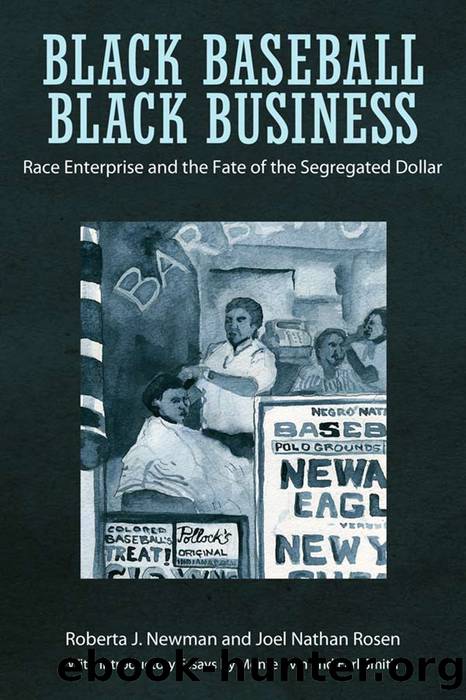Black Baseball, Black Business by Newman Roberta J.;Rosen Joel Nathan;

Author:Newman, Roberta J.;Rosen, Joel Nathan;
Language: eng
Format: epub
Publisher: University Press of Mississippi
Published: 2014-08-15T00:00:00+00:00
A Changing Political Landscape
Though wartime prosperity and the promise of a more democratic marketplace as advocated by Double V infused the rhetoric of progress for the race, the potential of economic stagnation in the early postwar environment was a definite reality. The possibility of massive job loss and with it the potential for a diminishing consumer base was not lost on either the black press or the Department of Labor. Citing a gain of approximately one million jobs between 1940 and 1944, the January 1945 issue of the Monthly Labor Review, an official publication of the Department of Labor, expressed concern about the potential for a severe decline in employment for African Americans in semiskilled positions in the industries most closely related to the war effort. The study, prepared by Seymour L. Wolfbein of the Occupational Outlook Division of the Bureau of Labor Statistics, reported that urban industrial employment had increased during the war years, while the number of those employed in agriculture decreased accordingly. In addition, Negroes had made substantial inroads in government employment.73
On the subject of employment prospects for African Americans after the war, however, the study expressed concern, noting that âthe Negro has made his greatest employment gains in those occupations (especially semiskilled factory jobs) which will suffer the severest cutbacks during the postwar period.â Wolfbein continued,
The Negro gains have taken place in congested production areas where considerable readjustment of the labor force will be necessary. In general, the Negro has been able to get his war job in areas where a substantial proportion of the labor force was also engaged in war work.⦠These cities, of course, will experience considerable labor turnover in the immediate postwar period.
⦠[I]n those occupations and industries in which the Negro has made his greatest employment advances, he was generally among the last to be hired. Therefore under seniority rules, he is more likely to be laid off than the average worker in these occupations.
The war has given many Negroes their first opportunity to demonstrate the ability to perform basic factory operations in a semiskilled and skilled capacity. The consolidation of the Negroâs gains in the postwar period (and this is true, of course, for a sizable, proportion of other workers as well) is dependent in large measure upon the volume of employment that then prevails.74
The potential for mass unemployment among participants in the African American ecosystem was so great that the Pittsburgh Courier cited the reportâs findings.75 The Courierâs editors clearly wanted to broadcast their concerns and create a sense of awareness among their readers. The Double V campaign could not be considered a success if it resulted in substantial declines in African American employment.
But what would have amounted to an economic catastrophe never manifested as predicted. A 1947 follow-up study by Wolfbein noted that no significant drop in employment had occurred. Though black workers continued to experience higher unemployment rates than their white counterparts, a higher percentage of black laborers were employed in manual labor and service, and black labor collectively remained less potent, wartime economic gains persisted.
Download
This site does not store any files on its server. We only index and link to content provided by other sites. Please contact the content providers to delete copyright contents if any and email us, we'll remove relevant links or contents immediately.
The Ultimate Backcountry Survival Manual by Aram Von Benedikt; Editors of Outdoor Life;(2978)
Never by Ken Follett(2921)
Liar's Poker by Michael Lewis(2824)
Machine Learning at Scale with H2O by Gregory Keys | David Whiting(2329)
Will by Will Smith(2083)
The Partner by John Grisham(1991)
Taste by Kris Bryant(1618)
Friends, Lovers, and the Big Terrible Thing by Matthew Perry(1353)
A Short History of War by Jeremy Black(1310)
The Arm by Jeff Passan(1309)
The Dodgers by Schiavone Michael;(1304)
HBR's 10 Must Reads 2022 by Harvard Business Review(1262)
Can't Hurt Me: Master Your Mind and Defy the Odds - Clean Edition by David Goggins(1246)
515945210 by Unknown(1220)
The Yogi Book by Yogi Berra(1205)
1942266391 (N) by Monte Francis(1180)
Road Games by Road Games(1135)
Moneyball by Michael Lewis(1107)
This Family Does It by Kevin Sellers(1084)
